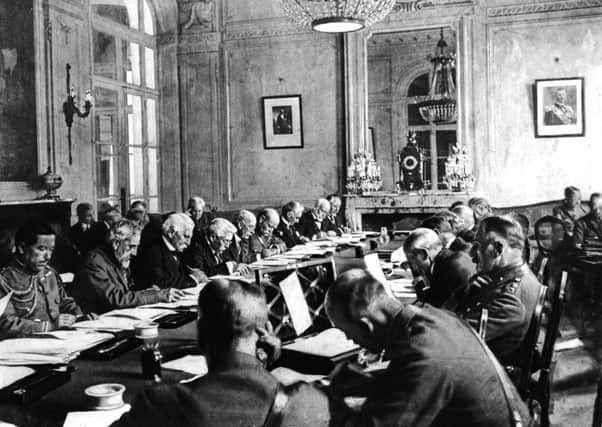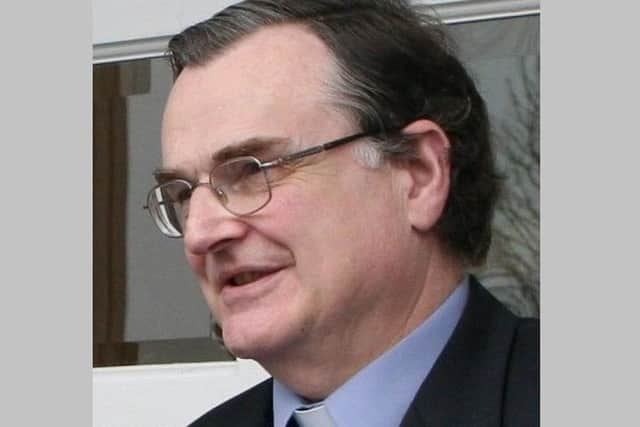Ian Ellis: At this time of remembrance the prospect of a war-free world seems a distant hope, but we should speak of the vision


In 2019 it is particularly appropriate to remember the Paris Peace Conference which opened in 1919 with the purpose of agreeing the peace terms following the conclusion of World War I.
That conference is especially known for its Treaty of Versailles which formally brought hostilities between Germany and the allied powers to an end.
Advertisement
Hide AdAdvertisement
Hide AdThis centenary year was marked last September with a peace conference held under the auspices of the Conference of European Churches (CEC) at the Protestant Theological Institute in Paris.


The Church of Ireland and the Methodist and Presbyterian churches in Ireland are full members of CEC, which in turn works closely with the European Roman Catholic bishops’ conferences.
Opening the Paris September gathering, the Rev. Christian Krieger of the Reformed Protestant Church of Alsace and Lorraine and President of CEC declared that the 1919 conference met “in the shadow of unspeakable human loss”.
He said: “Much of the world came to Paris in 1919 to try and construct a new world order and, after the most destructive war in history, perhaps to grasp a second chance to end war. High hopes were to be disappointed as much of the promise of Paris was unfulfilled.”
Advertisement
Hide AdAdvertisement
Hide AdA keynote speaker at the conference last September was the distinguished Irish Methodist, the Rev. Dr Johnston McMaster. In his address he commenced by pointing out that while the conference of one hundred years previously had stretched into 1920, its main work was done during the first half of 1919.
The Treaty of Versailles was concluded on June 28, 1919 which Dr McMaster pointed out was five years to the day after the teenage Serbian nationalist, Gavrilo Princip, shot dead the heir to the Austro-Hungarian throne, Archduke Franz Ferdinand, and his wife Sophie, in Sarajevo.
That assassination in the then highly volatile Balkan region is widely seen as lighting the fuse that set off World War I, but of course there was a whole complex of factors.
Although 32 countries sent delegations to the 1919 conference, it was especially under the influence of America, Britain, France and Italy whose representatives continued to see the world in their own way and in their own interests. Yet, even among themselves they were not at one.
Advertisement
Hide AdAdvertisement
Hide AdIn his 1,365-page ‘History of Europe’, Norman Davies has strikingly illustrated their mutual disregard: “The Americans suspected the British and French of imperialist designs. The British suspected the French of Napoleonic tendencies. Both the British and the French suspected the strength of America’s commitment.”
Suspicion and mistrust are far from new factors on the political stage, be it national or global.
Although called a ‘peace conference’, Paris 1919 was really a conference of victors who did not negotiate the peace but set out their stark demands of the vanquished Germany.
Dr McMaster commented at last September’s Paris meeting that at the time many felt the terms of the Treaty of Versailles were humiliating for Germany and that the Allies may well have been driven by vengeance.
Advertisement
Hide AdAdvertisement
Hide AdHe said that perhaps the most controversial aspect of the Treaty of Versailles was its Article 231, known as the ‘Guilt Clause’, which called on Germany to accept what Michael Neiberg in his book on the treaty had described as the responsibility of Germany and its allies for causing all the loss and damage to which the allied nations had been subjected “as a consequence of the war imposed upon them by the aggression of Germany and her allies”.
The crippling effect of £6.6 billion of war reparations, loss of territory and Article 231 all contributed to a discrediting of the Weimar government and the discontent in Germany that ultimately gave rise to Hitler.
As one looks back over history, war is a recurrent, if not constant, feature of human life. Must it always be so? Must there always be wars? Are we actually condemned to live in a world of violent conflicts? Is there any viable alternative?
Another interesting contribution at the Paris conference last September was made by the Berlin based Rev. Antje Heider-Rottwilm.
Advertisement
Hide AdAdvertisement
Hide AdIn the context of “rethinking security” she referred to initiatives, including Quaker inspired ones, on resolving problems and threats in a non-military way.
This involves a shift in thinking about security which a German church document has compared to transitioning from fossil fuels to alternative sources of energy. Things do not always have to be the way they always have been.
However, is the thought of a war-free world in any way realistic?
It certainly would seem to be a distant and rather forlorn hope, given humanity’s baser instincts, but perhaps the best starting place is to dare both to think the seemingly impossible and to speak of the vision. Those who gave their lives in past conflicts, often at very young ages, would surely not object.
Advertisement
Hide AdAdvertisement
Hide AdFor now, the important priority is never to allow violence or warfare to be glamorised in any way and for nations to resort to military action only when it is the absolutely last resort.
• Canon Ian Ellis is a former editor of The Church of Ireland Gazette